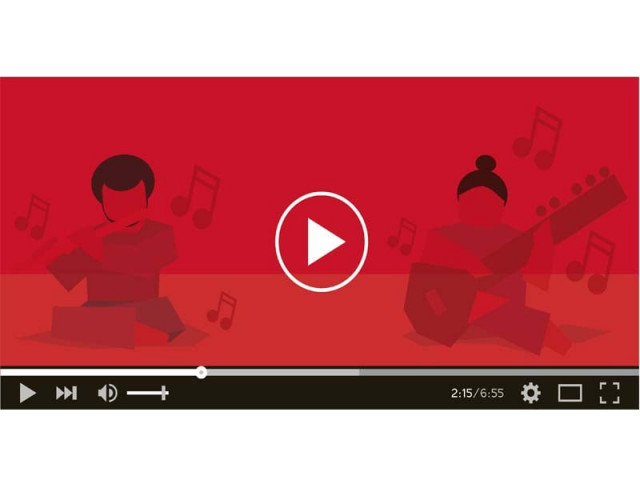The Indian who archives Pakistani mushairas, music on YouTube
In 10 years, Mirza Jamal has uploaded almost 2,000 videos with a combined view count of 29m

In 10 years, Mirza Jamal has uploaded almost 2,000 videos with a combined view count of 29m. DESIGN: SOBIA KHAN
Born and bred in Lucknow, Jamal left for Bombay to pursue commercial arts and later landed a job in the Gulf that kept him there for 20 years. His grandfather was a landowner in Sitapur and his uncle, Wajahat Mirza, was a screenwriter of great repute and the man behind classics like Mughal-e-Azam, Mother India and Gunga Jumna. Talking to The Express Tribune in an email interview, Jamal recalls of his native neighbourhood, “There was not a single street in Katra Abuturab Khan Mohallah that wouldn’t have a scholar or a poet’s residence. On one side there was Majnu Lakhnawi, on the other there was Hasrat Mohani.” Being related to a film giant of his time had its own perks. While living with Wajahat at the latter’s Bombay residence, Jamal got a chance to see writers like Jigar Muradabadi and Shakeel Badayuni in person. “Had I not developed a sensibility for arts and literature after all this, it would have been a real tragedy,” he quips.
YouTube launches country-specific homepage for Pakistan

From Bombay, he left for Dubai in 1975 and then for Muscat where he remained until 1996. The 90s were quite a time for the Middle East that was welcoming the South Asian working class with open arms and was still new to the intoxication of a newfound opulence. The Pakistani and Indian diasporas had begun to come together and mushairas of Dubai had begun to gain a foothold. It was this very changing world that enabled Jamal to rub shoulders with Pakistani litterateurs.
Literature enthusiast Salim Jafri spearheaded the mushairas of Dubai. In Muscat, there was Humayun Zafar Zaidi. “Basically, I began collecting recordings of programmes organised by them. Although Al Mansoor Video Company Dubai did record some of the Dubai mushairas, the Muscat ones were only with me.” Jamal says a bulk of his uploads are sourced to these two places. “I also have some videos from mushairas in India. I either obtained them from friends or bought them of the market,” he maintains.
In memoriam: Nasreen Anjum Bhatti euologised

Wajahat spent his last three years in Karachi on the insistence of his daughter. When he died in 1990 at the residence of his younger brother Murtaza Changezi, Jamal approached the Pakistani embassy in Muscat for a visa. “It got rejected on the basis that ‘chachas don’t count as blood relatives’,” he says, adding, “I tried again when Murtaza chacha died. It was rejected once again. It seems I was never destined to visit Pakistan.”
He might not have visited Pakistan but his collection of PTV videos is quite impressive to say the least. “I got them when I was in Muscat. Most of these are from 1993-94 when I recorded feed from the channel on my VCR,” he says. Had he known the very recordings would become a personal asset of sorts, Jamal says he would have done this on a proper basis.
The habit of collecting things goes back a long way. Jamal has been collecting books and magazines ever since he was young. “Then audio cassettes came and I began collecting those. When I was in the Gulf, video tapes were all the rage,” he recollects.

The idea of digitising these tapes struck him when he returned to Bombay. “I first got a few video cassettes converted to CDs from the market, edited the clips and uploaded them on YouTube.” Seeing the response to his uploads, Jamal began digitising the tapes himself. “I am glad I did this because today fungus has eaten away on most of them,” he adds.
Having been archiving for the past 10 years, Jamal hasn’t bogged down a bit. “I have a lot of audio cassettes that I have to digitise and upload. I have also started an e-book collection on Slideshare,” he says. So far he has made PDFs of over 150 books and magazines and has designed new covers for them.
Jamal’s sons have taught him how to edit videos and everything that he needs to know about using the internet. These days he is on the lookout for someone who would help him make audiobooks. “It is a need of the hour. In India the younger generation finds it hard to read Urdu although they can understand it.”
When asked how his channel touches lives, he narrates another incident. “I had uploaded 4 videos of Jyoti Pande reciting ruba’iyat. A few days later I received a message from his brother who lives in the States, saying that these recitals are over 20 years old and no one in the family has them! He asked me, ‘Where did you get them from?’” he recollects. Jamal is also unknowingly a valuable source when it comes to literary research. “I get messages from people saying how some of my rare uploads helped them with their research work. Someone is working on Amir Khusrow. Another is exploring na’at … I just try to help them in whatever way I can,” he says.
Kunwar Mohinder Singh Bedi was a Sikh poet of Urdu known for his sense of humour that transcended political, religious correctness. “His son Karamjit Singh Bedi contacted me and said he wants Kunwar sahab’s recital videos that I uploaded, in order to release a DVD.”

Jamal admits his audience on YouTube largely comprises the older generation that has begun to feel the pinch of nostalgia. “Between 2007 and 2010, my channel was amongst the top 100 channels from India,” he mentions. Although he proudly talks about his relationship with Wajahat, Jamal still blames Indian cinema, particularly contemporary Bollywood, for short-changing the people. “These bawdy Bollywood numbers have taken over YouTube,” he laments, adding, “I never upload film music. Although my channel does have some 29 recordings of Mohammad Rafi sahab ... they consist of his non-film singing and recitals.” Jamal also has a playlist of religious hymns and eulogies recited by singers like Noor Jehan, Nayyara Noor, Salma Agha and Talat Mehmood. “Okay, I do have film music but that’s only Begum Akhtar’s … and that too her ghazals, thumris and dadras because I wanted to collect them together,” he has an afterthought. Jamal says very few people are aware that Akhtar also sang ghazals in Bangla and Gujrati. “People found out once I put them up,” he adds.
In uploading hours and hours of footage from different TV shows, age-old cassettes and live shows, Jamal must have encountered issues of copyrights. According to the art maven, the issue of copyrights is a little problematic. “For instance, there is a Qateel Shifai ghazal or an Ahmed Faraz ghazal that someone has sung in either India or Pakistan. Naturally a recording company would own the rights to that song … but what about videos of poets reciting these pieces at mushairas themselves? I have lost many of my videos of Faraz, Obaidullah Aleem, Shameem Jaipuri, Santosh Anand and countless others.”

There are only a handful of people who come to the mind when you think of those who took up archiving as a personal project and their collections gained fame. Pakistan’s Lutfullah Khan is one such individual. But there’s a problem. None of his possessions are available for 24/7 public access. “It’s the same in India. They will let their collections rot in the store but will never let others benefit from them,” he says. According to Jamal there are several such families in Lucknow that own a considerable amount of such material. “But they revere them so much that they won’t touch them.”

He feels there are many who don’t know the historical importance of these recordings. “I had this friend in Lucknow, Shaukat Chaudhary sahab. He was associated with national radio at one point. He used to record mushairas held around the city. After retirement he started a modest company and used to sell the CDs,” he says, adding, “He himself once told me that he has 2 rooms full of tapes.” Chaudhary always promised Jamal of giving him his collection. “After his death, I inquired from his son who said only eight months ago he sold the entire collection at the hands of a scrap dealer.”
Published in The Express Tribune, April 1st, 2016.
Like Life & Style on Facebook, follow @ETLifeandStyle on Twitter for the latest in fashion, gossip and entertainment.



















COMMENTS
Comments are moderated and generally will be posted if they are on-topic and not abusive.
For more information, please see our Comments FAQ